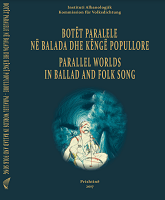PARALLEL WORLDS IN THE ARBËRESH SONG ‘O E BUKURA MORE’ (OH, MY BEAUTIFUL MOREA)
PARALLEL WORLDS IN THE ARBËRESH SONG ‘O E BUKURA MORE’ (OH, MY BEAUTIFUL MOREA)
Author(s): Ardian Ahmedaja
Subject(s): Customs / Folklore, Music, 18th Century, Migration Studies
Published by: Instituti Albanologjik i Prishtinës
Keywords: Albanian Diaspora; Arbëresh; Arbëresh Traditions; Siege of Coron; Migration; Music and Migration;
Summary/Abstract: This is one of the best-known songs of the Albanian diaspora (the Arbëresh) in Italy. The song lyrics are replete with homesickness for a land which was left and is never to be seen again. Curiously enough, this land is Morea, in the south-west of the Peloponnese in Greece. The name Morea is connected with the exodus of the Arbëresh to southern Italy and Sicily after the fall of Koroni to the Ottomans during the Siege of Coron, 1532–34. The question is, why has this particular song become a symbol of the exodus for this diaspora? The answer lies in the visible and non-visible parallel worlds of the song as well as those projected into it. These will be the main focus of this article. The first mention of the song is in 1775, though the metric structure indicates an older origin. Arbëresh intellectuals and priests have provided important information about the customs and rites of which the song has been part and, despite their romantic view, they have helped scholars to recognize the magical-religious context from which the song originated and how it has been transformed to the “nostalgic hymn” known and performed today also among Albanians in the Balkans.
Book: BOTËT PARALELE NË BALADA DHE KËNGË POPULLORE
- Page Range: 273-318
- Page Count: 46
- Publication Year: 2017
- Language: English
- Content File-PDF

